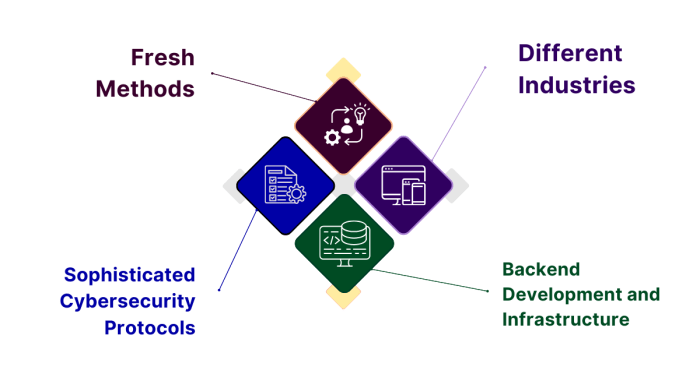Outsourced software product development company – In today’s dynamic business landscape, the decision to outsource software product development is becoming increasingly common. This strategic move allows companies to leverage external expertise, reduce costs, and accelerate time-to-market for their software projects. This comprehensive guide will delve into the intricacies of outsourced software product development, exploring its benefits, challenges, and best practices. We’ll also cover crucial aspects like choosing the right outsourcing partner, managing the development process, and ensuring successful project delivery.
Understanding these factors is critical for businesses looking to maximize the return on their investment in outsourced software development.
Understanding Outsourced Software Product Development
Outsourced software product development involves contracting a third-party company to handle all or part of the software development lifecycle. This can range from designing and developing the software to testing, deployment, and ongoing maintenance. This model offers flexibility, allowing companies to tailor their outsourcing strategy to their specific needs and resources. The outsourcing model can encompass various engagement models, including:
Common Outsourcing Models
- Dedicated Teams: A dedicated team of developers, designers, and testers works exclusively on your project, providing close collaboration and dedicated resources.
- Project-Based Outsourcing: A fixed-scope project with clearly defined deliverables and timelines. This is ideal for smaller, well-defined projects.
- Time and Material Outsourcing: You pay for the time and resources spent on your project. This model offers flexibility but requires careful monitoring of costs.
- Staff Augmentation: Supplementing your in-house team with external developers to address specific skill gaps or increased workload demands.
Benefits of Outsourcing Software Product Development
Outsourcing offers numerous advantages, significantly impacting a company’s bottom line and overall efficiency. These benefits include:

Source: webflow.com
Cost Reduction
- Reduced overhead costs associated with hiring, training, and managing an in-house development team.
- Access to a global talent pool, often leading to lower labor costs.
- Potential for cost savings through economies of scale offered by outsourcing providers.
Access to Specialized Expertise
- Tap into a wider range of specialized skills and technologies not readily available in-house.
- Benefit from the experience and expertise of seasoned developers and project managers.
- Focus internal resources on core business competencies.
Faster Time-to-Market
- Accelerated development cycles due to the availability of dedicated resources and streamlined processes.
- Faster prototyping and iterative development, allowing for quicker feedback and adjustments.
- Reduced time-to-market, giving your company a competitive edge.
Increased Scalability and Flexibility
- Easily scale your development team up or down based on project needs.
- Adapt to changing market demands and project requirements with greater agility.
- Flexibility to choose different engagement models based on specific project needs.
Challenges of Outsourcing Software Product Development
While outsourcing presents many benefits, it also comes with its set of challenges:
Communication Barriers
- Potential for miscommunication due to language differences or cultural variations.
- Importance of establishing clear communication channels and protocols.
- Regular communication and collaboration are crucial for successful project outcomes.
Quality Control
- Ensuring the quality of the outsourced work requires rigorous testing and quality assurance processes.
- Thorough vetting of potential outsourcing partners is essential.
- Establishing clear quality standards and metrics is critical.
Intellectual Property Protection, Outsourced software product development company
- Protecting your intellectual property requires careful contract negotiation and security measures.
- Strong non-disclosure agreements and data security protocols are necessary.
- Choosing a reputable and trustworthy outsourcing partner is paramount.
Time Zone Differences
- Managing projects across different time zones can create logistical challenges.
- Effective project management tools and communication strategies are essential.
- Careful planning and coordination are crucial to mitigate potential delays.
Choosing the Right Outsourcing Partner
Selecting the right outsourcing partner is a critical step in ensuring a successful project. Consider the following factors:

Source: communicationcrafts.com
- Experience and Expertise: Look for a partner with a proven track record in your specific industry and technology stack.
- Technical Skills and Capabilities: Assess the partner’s proficiency in the required technologies and programming languages.
- Communication and Collaboration: Evaluate their communication skills and responsiveness.
- Security and Data Protection: Verify their security measures and data protection policies.
- Client References and Testimonials: Review client feedback to gauge their reputation and reliability.
- Project Management Methodology: Assess their project management approach (Agile, Waterfall, etc.) and its suitability for your project.
Managing the Outsourcing Process
Effective project management is vital for successful outsourcing. Key aspects include:
- Clearly Defined Scope and Requirements: Develop a detailed project scope document outlining all requirements, deliverables, and timelines.
- Regular Communication and Reporting: Establish clear communication channels and regular progress reports.
- Quality Assurance and Testing: Implement rigorous testing procedures throughout the development lifecycle.
- Risk Management: Identify and mitigate potential risks proactively.
- Contract Management: Ensure a well-defined contract outlining all terms, conditions, and responsibilities.
Frequently Asked Questions (FAQ)
- Q: What are the common outsourcing destinations? A: Popular destinations include India, Eastern Europe, Latin America, and Southeast Asia, each offering different strengths in terms of cost, expertise, and time zones.
- Q: How do I protect my intellectual property when outsourcing? A: Through robust NDAs (Non-Disclosure Agreements), secure code repositories, and regular audits of the outsourcing partner’s security practices.
- Q: What is the best outsourcing model for my project? A: The ideal model depends on the project’s size, complexity, and your specific needs. Dedicated teams are often preferred for larger, long-term projects, while project-based outsourcing is suitable for smaller, well-defined projects.
- Q: How can I ensure the quality of the outsourced software? A: Through thorough vetting of the outsourcing partner, detailed specifications, regular testing, and clear quality control processes.
- Q: What are the potential risks of outsourcing software development? A: Potential risks include communication barriers, quality control issues, intellectual property concerns, and time zone differences. Careful planning and mitigation strategies can minimize these risks.
Conclusion
Outsourcing software product development offers significant advantages for businesses seeking to reduce costs, access specialized expertise, and accelerate time-to-market. However, careful planning, partner selection, and effective project management are crucial for success. By understanding the benefits, challenges, and best practices Artikeld in this guide, companies can make informed decisions and maximize the return on their investment in outsourced software development.
References
- Gartner (for market research and industry insights)
- Statista (for statistics on outsourcing)
- Forbes (for business and technology articles)
Call to Action: Outsourced Software Product Development Company
Ready to explore the benefits of outsourced software product development? Contact us today for a free consultation and let’s discuss how we can help you achieve your software development goals.
Question Bank
What are the common risks associated with outsourcing software development?
Common risks include communication barriers, intellectual property concerns, quality control issues, and potential delays.
How can I ensure the security of my intellectual property when outsourcing?
Utilize robust Non-Disclosure Agreements (NDAs), choose reputable companies with proven security practices, and regularly audit the vendor’s security measures.

Source: gmtasoftware.com
What factors should I consider when choosing an outsourced software development company?
Consider their experience, expertise in relevant technologies, client testimonials, communication capabilities, and their development process.
What is the typical cost structure for outsourced software development?
Costs vary significantly depending on factors like project complexity, team size, location of the development team, and the chosen engagement model (e.g., fixed price, time and materials).
